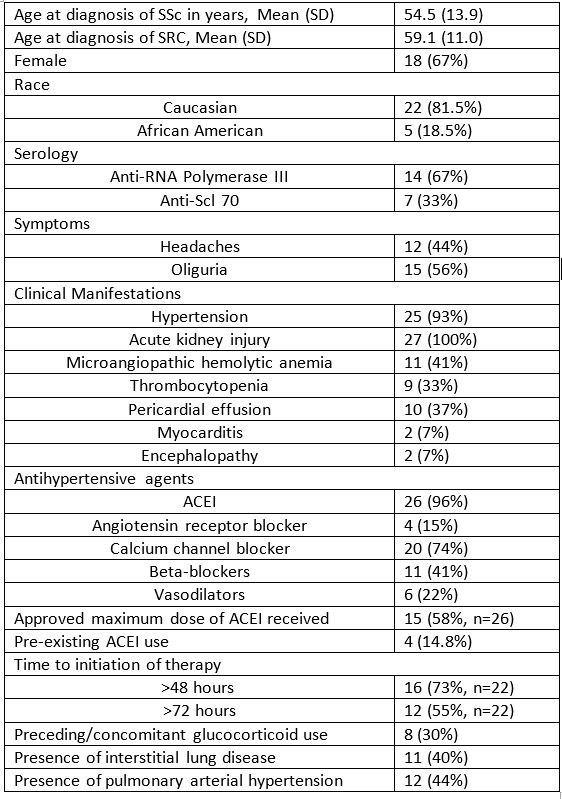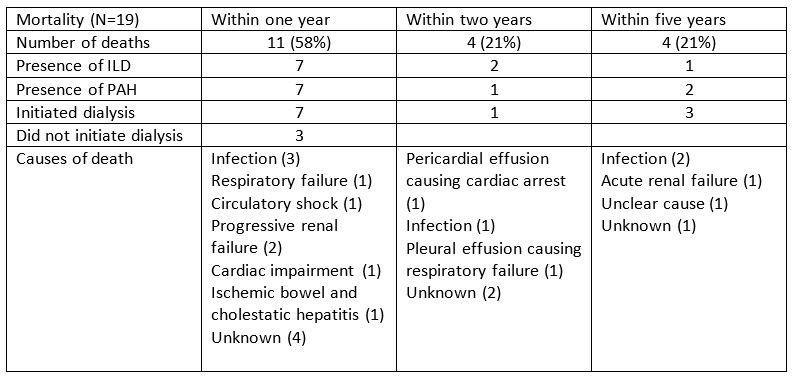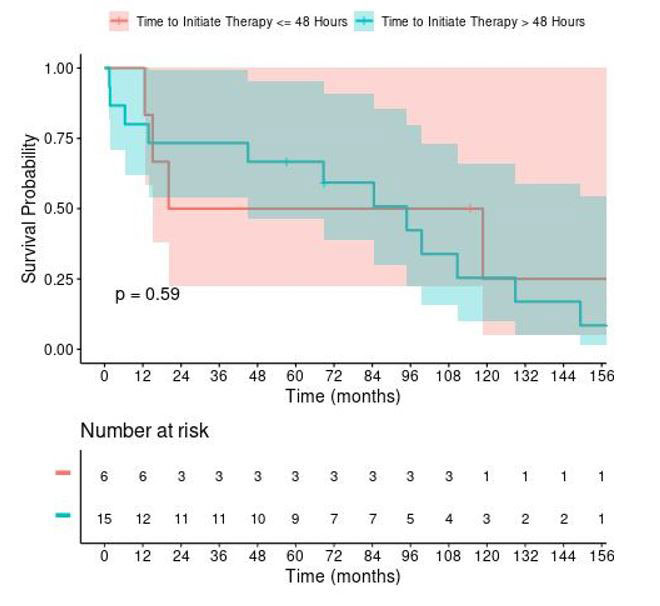Session Information
Date: Sunday, November 13, 2022
Title: Systemic Sclerosis and Related Disorders – Clinical Poster II
Session Type: Poster Session C
Session Time: 1:00PM-3:00PM
Background/Purpose: Scleroderma renal crisis (SRC) is a rare complication in patients with systemic sclerosis (SSc), characterized by accelerated hypertension and acute kidney injury. ACE inhibitors (ACEI) are known to improve outcomes in SRC. However, the mortality remains high even in the post-ACEI era. There are limited data on clinical characteristics and long-term outcomes in patients with SRC about timing of initiation of therapy and causes of death. We evaluated the effect and timing of treatment on long-term outcomes in patients with SRC.
Methods: We screened 401 adult patients with SSc (fulfilling 2013 ACR/EULAR criteria) in our institution from 2004 to April 2022, of which 27 patients satisfied the diagnosis of SRC, as defined by Steen et al.1 Data on patient demographics, clinical presentation, serology, time to initiation of therapy, and type of therapy were collected. The following outcomes were included: mortality, initiation of dialysis, and renal recovery. Follow-up was censored on April 25th, 2022. Categorical measures were summarized with frequency (%). Continuous measures were expressed as mean (SD) and analyzed with two-sample t-tests. To compare outcomes with timing of therapy, hazard ratios and Cox proportional hazard models were utilized. All tests were two-sided, assuming an alpha level of 0.05.
Results: Our cohort included 27 patients of which two patients had normotensive renal crisis. Baseline characteristics, clinical features and disease course of patients with SRC are shown in Table 1. Dialysis was initiated for 52% of patients (14/27), whereas three patients did not want dialysis. Patients who were started on ACEI >48 hours after onset of symptoms were more likely to require dialysis (75.6% vs 16.7%, p=0.023), whereas it did not affect survival probability (Figure). Renal recovery was noted in eight (30.8%, n=26), whereas three patients had a relapse, and one patient went on to have a renal transplant. Time to renal recovery was noted to be 4.08 (4.82,SD) months. The overall mortality rate was 70% (19/27), while two patients were lost to follow up. Data on timing of death after diagnosis of SRC, causes of death, and associated clinical manifestations are shown in Table 2.
Conclusion: Early (< 48 hours) initiation of ACEI in patients with SRC significantly reduced the need for dialysis, although it did not affect mortality. Despite treatment with ACEI, all-cause mortality after SRC remains high.
Reference:
1. Steen VD, Medsger TA. Long-Term Outcomes of Scleroderma Renal Crisis. Ann Intern Med. 2000;133:600–603.
To cite this abstract in AMA style:
Patel A, Zhang C, Chatterjee S. Scleroderma Renal Crisis: Time to Initiation of Therapy Does Not Affect Mortality [abstract]. Arthritis Rheumatol. 2022; 74 (suppl 9). https://acrabstracts.org/abstract/scleroderma-renal-crisis-time-to-initiation-of-therapy-does-not-affect-mortality/. Accessed .« Back to ACR Convergence 2022
ACR Meeting Abstracts - https://acrabstracts.org/abstract/scleroderma-renal-crisis-time-to-initiation-of-therapy-does-not-affect-mortality/



